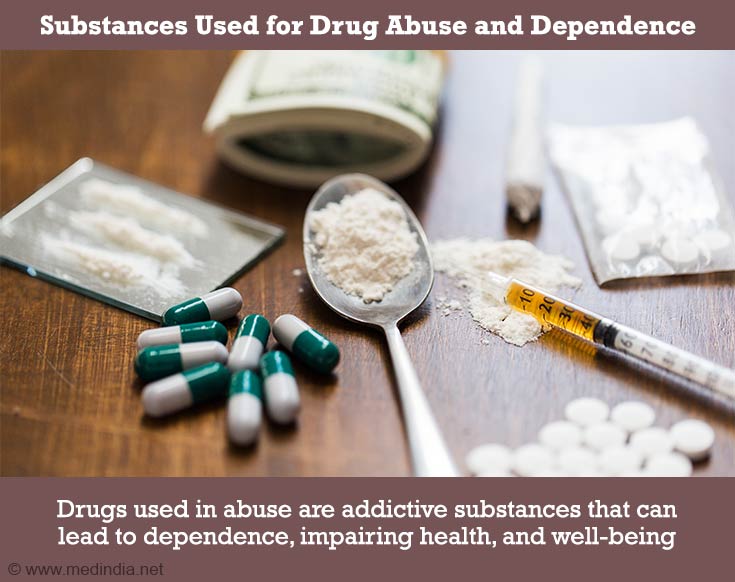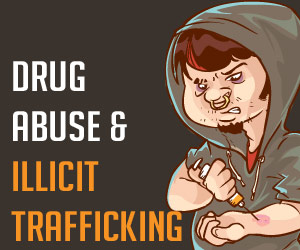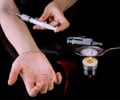- The Essentials of Forensic Medicine and Toxicology - KSN Reddy and OPMurty - (https://www.researchgate.net/publication/282075236_The_Essentials_of_Forensic_Medicine_and_Toxicology_-_KSN_Reddy_and_OPMurty)
- Substance Abuse - (https://www.ncbi.nlm.nih.gov/books/NBK319/)
- Understanding the epidemiology of substance use in India: A review of nationwide surveys - (https://www.ncbi.nlm.nih.gov/pmc/articles/PMC10309258/)
- What is drug addiction? - (https://nida.nih.gov/publications/drugs-brains-behavior-science-addiction/drug-misuse-addiction)
- Warning Signs of Drug Abuse - (https://www.tn.gov/behavioral-health/substance-abuse-services/treatment---recovery/treatment---recovery/prescription-for-success/warning-signs-of-drug-abuse.html)
- Drug Abuse and Addiction - (https://www.helpguide.org/articles/addictions/drug-abuse-and-addiction.htm)
- Forensic medicine and toxicology: principles and practice - (https://books.google.co.in/books?hl=en&lr=&id=pOd2EVL5xAwC&oi=fnd&pg=PA3&dq=forensic+medicine+and+toxicology:+principles+and+practice&ots=6s2NnA729-&sig=3en5D6ZqCWPqMoV1XJnZGz1OBYA#v=onepage&q=forensic%20medicine%20and%20toxicology%3A%20principles%20and%20practice&f=false)
- Substance Abuse Treatment Types & Therapy Programs Near Me - (https://americanaddictioncenters.org/therapy-treatment)
- How to reduce or quit drugs - (https://www.health.gov.au/topics/drugs/about-drugs/how-to-reduce-or-quit-drugs)
- Prevention of substance abuse: a brief overview - (https://www.ncbi.nlm.nih.gov/pmc/articles/PMC1414714/)
- Children and addictions (drugs, alcohol) - (https://www.humanium.org/en/children-and-addictions/)
- People first: stop stigma and discrimination, strengthen prevention - (https://www.un.org/en/observances/end-drug-abuse-day)
- International Day against Drug Abuse and Illicit Trafficking - (https://www.unodc.org/unodc/en/drugs/index-new.html)
- Substance Use and Co-Occurring Mental Disorders - (https://www.nimh.nih.gov/health/topics/substance-use-and-mental-health)
- Drugs (psychoactive) - (https://www.who.int/health-topics/drugs-psychoactive#tab=tab_1)
- Alcohol Dependence, Withdrawal, and Relapse - (https://www.ncbi.nlm.nih.gov/pmc/articles/PMC3860472/)
About
According to the World Health Organization, a drug is defined as any substance or product utilized or intended for use in modifying or exploring physiological systems or pathological states to benefit recipients. Drug dependence occurs when someone uses a substance too much, causing problems like not being able to control its use, continuing to use it even if it's harmful, and putting it before other important things(1✔ ✔Trusted Source
The Essentials of Forensic Medicine and Toxicology - KSN Reddy and OPMurty
Go to source). It's seen as a brain disorder because it leads to lasting changes in the brain's nervous system related to pleasure, stress, and self-control(4✔ ✔Trusted Source
What is drug addiction?
Go to source).
Drug Abuse
Drug abuse is when someone uses drugs too much, regularly or occasionally, in a way that's not considered medically acceptable. It happens because of a bad habit of using substances, leading to repeated and serious problems caused by using the substance(1✔ ✔Trusted Source
The Essentials of Forensic Medicine and Toxicology - KSN Reddy and OPMurty
Go to source).
Substances Commonly Used for Abuse and Dependence
- Opioids: Heroin, morphine, and meperidine
- Hypnotics and sedatives: Barbiturates, diazepam (Valium), chlordiazepoxide hydrochloride (Librium), methaqualone (Quaalude)
- Stimulants: Amphetamine, cocaine
- Hallucinogens:
Lysergic acid diethylamide (LSD) , phencyclidine (PCP), mescaline - Volatile hydrocarbons: Gasoline, paint thinner
- Cannabinoids: Marijuana, hashish
- Alcohol(2✔ ✔Trusted Source
Substance Abuse
Go to source)

Epidemiology Overview
In India, about 40% of people use tobacco, with men using it much more than women. Alcohol use varies between 15% and 19%, depending on the survey(3✔ ✔Trusted Source
Understanding the epidemiology of substance use in India: A review of nationwide surveys
Go to source). Cannabis use is around 2.8%, with most using legal forms like bhang. Opioid use is about 2.1%, mainly from heroin and pharmaceutical drugs. Other substances, like sedatives and stimulants, are used by less than 1% of the population. Women use substances less than men, with tobacco and alcohol being the most common. For young people, tobacco use is declining, but about 1.3% use alcohol and 0.9% use cannabis(3✔ ✔Trusted Source
Understanding the epidemiology of substance use in India: A review of nationwide surveys
Go to source).
Risk Factors
Situations and circumstances play an important role in drug dependence and abuse, which include -
- Stress
- Mental disorder
- Absence of parental care
- Poverty in the community
- Low peer refusal skills
- Drug testing
- Drug availability in schools(4✔ ✔Trusted Source
What is drug addiction?
Go to source)
Mode of Drug Dependence and Abuse
People use various ways to take drugs, depending on the substance and the desired effect on the brain. Absorbing drugs through the stomach is slow and less intense, so people may need to take a lot. Inhaling drugs, like nicotine from tobacco, can make absorption faster but only works for certain substances. Some drugs, like cocaine, can be absorbed through the skin or mucous membranes, but this is not very common. Cocaine is often dissolved and sniffed into the nose, known as snorting. The fastest way to get drugs to the brain is through injection. Injecting under the skin is called skin popping, and injecting into veins is called mainlining, which is preferred for powerful painkillers(7✔ ✔Trusted Source
Forensic medicine and toxicology: principles and practice
Go to source).
Signs of Drug Dependence and Abuse
Risks and Behavior
- Taking dangerous risks like driving under the influence or having unprotected sex.
- Neglecting responsibilities at school, work, or home.
- Getting into legal trouble.
Physical Changes
- Bloodshot eyes or pupils that are bigger or smaller than usual.
- Changes in appetite, sleep patterns, or physical appearance.
- Unusual smells on the breath, body, or clothing.
- Problems with coordination.
Behavioral Changes
- Poor performance in school and work.
- Acting secretive or suspicious.
- Spending time with new friends or in new places.
- Losing interest in old hobbies.
Psychological Changes
- Sudden changes in personality or mood.
- Frequent mood swings, irritability, or anger outbursts.
- Feeling anxious, paranoid, or scared for no reason(5✔ ✔Trusted Source
Warning Signs of Drug Abuse
Go to source).
Symptoms of Drug Dependence and Abuse
- Loss of appetite and weight
- Clumsy movements and an unsteady gait
- Reddened and puffy eyes, unclear vision
- Slurred speech
- Loss of interest, sleeplessness, lethargy
- Acute anxiety, depression, sweating
- Mood changes, temper tantrums
- Impaired memory and concentration(1✔ ✔Trusted Source
The Essentials of Forensic Medicine and Toxicology - KSN Reddy and OPMurty
Go to source, 6✔ ✔Trusted Source
Drug Abuse and Addiction
Go to source)
Withdrawal Symptoms
When you stop taking drugs after using them for a while, your body can get disturbed in its metabolism and react in different ways. These lead to feeling cold, anxious, and restless, having rapid breathing, goosebumps, dilated pupils, and no appetite. You might also experience intense fatigue, fever, high blood pressure, pain, cramps, sweating, vomiting, and diarrhea. These symptoms usually last for a few days to a few weeks, depending on the specific drug and duration of use. If you experience any severe symptoms, like seizures or hallucinations, one should seek medical attention immediately(1✔ ✔Trusted Source
The Essentials of Forensic Medicine and Toxicology - KSN Reddy and OPMurty
Go to source, 6✔ ✔Trusted Source
Drug Abuse and Addiction
Go to source).
Treatment for Drug Dependence and Abuse
There is no universal treatment protocol. It depends on the type of drug abused. Different drugs have different withdrawal symptoms and require different medication and therapy approaches. Medical treatment for drug abuse plays a key role in managing withdrawal symptoms and preventing relapse. Other treatments will be detoxification, medication-assisted treatment (MAT), and addressing co-occurring mental health issues(7✔ ✔Trusted Source
Forensic medicine and toxicology: principles and practice
Go to source).
Rehabilitation
Depending on the addiction's severity, different levels of rehabilitation may be needed. Detoxication programs medically manage withdrawal symptoms for several days to weeks. Inpatient/Residential programs provide 24/7 supervision and structured care plans for weeks to months. Outpatient programs offer flexible therapy sessions, perfect for those with personal or professional responsibilities(8✔ ✔Trusted Source
Substance Abuse Treatment Types & Therapy Programs Near Me
Go to source).
Benefits of Quitting Drugs
Quitting drugs is a positive step that can bring significant improvementto various aspects of life. It helps you stay physically and mentally well, making you feel happier. Reduces the risk of causing permanent harm to your vital organs and decreases the likelihood of life-threatening situations.Saying no to drugs helps you have better relationships with friends and family, creating a positive social environment. You might also feel more energetic and sleep better, leading to an overall healthier life(9✔ ✔Trusted Source
How to reduce or quit drugs
Go to source)
Prevention of Drug Dependence and Abuse
Drug abuse prevention involves various efforts to reduce the chances of people using and abusing drugs. This includes addressing individual risk factors, promoting protective factors, and changing social norms around drug use. It encompasses multiple strategies, like educational programs, family interventions, community initiatives, and policies regulating availability. By focusing on both early prevention and intervention, we can build a healthier future for everyone(10✔ ✔Trusted Source
Prevention of substance abuse: a brief overview
Go to source).










